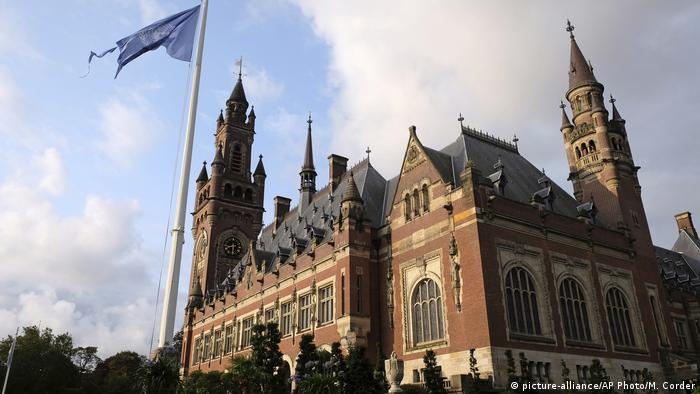Iran sees itself as a winner in the dispute with the United States to the sanctions. The United States now want to review all of the contracts in connection with the court. An Overview of how the ICJ works.

The International court of justice (ICJ) is unofficially often referred to as the “world court”, and judge their decisions in the impressive peace Palace in The Hague. The latest decision of the ICJ, however, for the vortex: The sanctions of the United States of America against the Islamic Republic of Iran should not affect civilian air traffic, and no drugs, medical devices or food. Iran rejoices, the United States romp. An Overview of the functions of the International court of justice and its Effect.
What takes care of the International court of justice?
The ICJ has jurisdiction when States argue. Only you can file a lawsuit against each other, but no individuals, as it is in front of the International criminal court. The ICJ is basically available only to members of the United Nations. With the signing of the UN Charter, States have also recognized the ICJ. However, there is a big But, as Professor Stefan Talmon, Director of the Institute for international law at the University of Bonn: “in Principle, a state may be sued on the basis of state sovereignty only with his consent, in front of an international court of justice.”
What are the options to sue a state?
States can sue in the ICJ in a different way. The ad hoc could happen, Talmon, when a dispute arose: “but That’s very rarely the case, because usually one of the parties will be in a worse Position and, therefore, the dispute settlement before the ICJ on an ad hoc basis, do not agree to.” In addition, there is the so-called international dispute resolution agreement, in which States generally, or for specific questions, disputes to an international court.
Apart from this, there are dispute resolution clauses, the record States, in property contracts. These clauses define, disagreements over the respective Treaty to the ICJ for decision. “This is, for example, now the case between Iran and the United States. The Treaty of friendship of 1955, Iran has now called, includes such a dispute resolution clause,” says Talmon.

Stefan Talmon, an expert in international law at the University of Bonn
As a further possibility, States may declare in advance their agreement to a resolution of a Case before the ICJ, by making a Declaration of Submission. “The States that have submitted such declarations, may sue before the ICJ each other,” said the expert in international law. The United States had withdrawn its submission of the Declaration in the 1980s, when you are sued by Nicaragua because of its support of the Contras in the Nicaraguan civil war and by the ICJ due to violations of international law were convicted. That States this Declaration, according to Talmon, is not uncommon: “at the moment, only a state of a permanent member of the UN security Council has issued, such a Declaration of Submission, and that is the United Kingdom.”
In the case of Iran-United States there is a decision, not a judgment. Why?
The United States have questioned the competence of the International court of justice even before the publication of his decision. They believe that the ICJ should not have to deal with the sanctions, because Iran takes the clause in the Treaty of friendship as a basis. “The United States does not assert that there is a dispute over the Treaty of 1955, but that nature is ultimately a dispute over the decision of the U.S. President by may 2018, to impose again sanctions against Iran,” says a lawyer Talmon. Therefore, it could lead initially to a procedure, the Jurisdiction, before it comes to the actual decision on the merits.

Represented the United States in The Hague: a lawyer, Jennifer Gillian Newstead and adviser Donald Earl Childress
Stefan Talmon believed, incidentally, that the ICJ in this case is mostly in fact not responsible. “You can see to the very limited extent of the precautionary orders which he has made.”
How assertive the court?
This is a Problem of many instances of the United Nations. “There is no world policeman who uses the law against the individual States in the end”, says Stefan Talmon. A possibility there, but in theory The ICJ could be the UN security Council to ask its judgment to enforce. “But that’s happened so far, but never,” says Talmon.
Otherwise, the Knowledge: remains UN members have committed themselves to the decisions of the ICJ. A state should not stick to it, it remains only to: media and citizens can make pressure. However, the States have so far been in more than 90 percent of the cases, the decisions of the ICJ, lawyer Talmon: “you don’t say: If I stick to it, what guarantee do I have, if I’m suing a different state, that keeps it? It is a question of reciprocity.”
What is the significance of the ICJ has, in spite of this limited enforcement power?
“The ICJ is of paramount importance”, is a lawyer Talmon convinced. He contributes to the peaceful settlement of inter-state conflicts. “He offers the States the opportunity to resolve disputes peacefully while respecting your face and without war.”
Iran is actually the winner in the current case?
Stefan Talmon suggests, the developments in the suit against the United States in a different way: “in the end, one must say that Iran has lost up to 95 percent. In the majority of cases in which the ICJ, the precautionary measures adopted, planned, the United States never to impose sanctions.” Iran did not actually want to achieve that the already imposed sanctions of the USA will be completely abandoned.

Had hoped for more: Mohammed Zahedin Labbaf, Director of the Center for International Legal Affairs in Iran (on the right)
Therefore, Talmon believes that the US will adhere to the ICJ-decision. “The only question is where problems could occur relates to the delivery of spare parts, equipment, and maintenance services for civil aviation. But everything else – medical devices, medicinal products, food – have been excluded to a large extent, from that of the US sanctions,” says Talmon. “The USA has no need to do anything to the arrangement.”
What are the long-term significance of the case of Iran-the USA has?
A lawyer, Talmon believes that Iran have proven to be, by its action, international law and the peaceful settlement of disputes is a disservice. The United States as a permanent Member of the security Council and the only remaining world power as a result of the litigation, from important international treaties that include a dispute resolution clause. So you want to avoid in the future of judicial dispute resolution, and the Instrument will “undermine”.